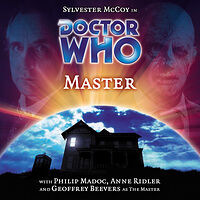
There are 4 reviews so far. To add a review of your own for this item, visit the voting page.
 |  |  |

 | Grim, but not the typical Master story.. |
|
 |  |  |
| By: | Doug, Pocono Summit, PA, USA |
|
| Date: | Monday 30 October 2006 |
|
| Rating: |    8 8 |
As the cover indicates, Master is a dark and dreary tale. But this story shows us the Master in a new light and makes it believable. In doing so, it turns the Geoffrey Beevers Master into the richest character of the four incarnations we've seen (counting Eric Roberts' version as one), which is rather amazing, given that this incarnation has really only had three appearances at this point (plus The Deadly Assassin, where this incarnation is played by Peter Pratt).
True to what was done in Dust Breeding, the Beevers' Master is again shown to be quite scary and genuinely menacing in this story. I won't give away what it is here that expands his character so much.
It's also interesting to hear Philip Madoc again, and all of the small cast give top-notch performances here. Overall, the story is quite intriguing, and is one of the more imaginative of the Big Finish series.
 |  |  |

 | Demands to be taken seriously |
|
 |  |  |
| By: | James, London |
|
| Date: | Friday 22 December 2006 |
|
| Rating: |    7 7 |
Of all the attempts to make Dr Who more "mature", this is the first I've met that I could take seriously.
Joseph Lidster has been very canny in acknowledging that the Master of the TV series had no apparent motive but to inconvenience the Doctor. Thus, the play doesn't fall into the trap of imposing unconvincing meaning on the Master's pantomime-villain actions. He makes a real attempt to portray the Master as both monstrous and pathetic. One thing I liked is that at the end of the play, we still didn't know how to what extent the Master was responsible for his own ctions.
It helps that the play sounds professional, with good sound effects and appropriate music. The small cast are uniformly good - though I do think the scriptwriter gave McCoy too many "r's" to rrroll! Special mention goes to Beever, who manages to swtich between the "good" and "evil" Masters very convincingly.
The premise is intriguing and gets the time it needs to be fully explored, although the old house setting is a bit hackneyed. The play conveys a sense of claustrophobia (aided by a small cast), smartly counterpointed by occaisional break as the Doctor tells the story to an assassin.
The meat of the play is in the 2nd and 3rd episodes. There is some very clever Master character stuff in these parts too (e.g. unknowingly using hypnotism on his maid and unconsciously manipulating his friends).
The problem of this play taking itself seriously is that I felt compelled to listen critically, as I would to serious drama. I therefore couldn't help but notice that the final part seem both "stretched" and rushed. Both the Doctor and the Master are portrayed largely as helpless pawns of cosmic forces, which I'm not sure I like. Also, you might not get many of the references if you're not a hardcore fan - I certainly felt there was stuff I was missing. Much of the play is dialogue between too people, but I don't mind this.
 |  |  |

 | No More Personified Abstractions, Please |
|
 |  |  |
| By: | David Layton, Los Angeles, United States |
|
| Date: | Wednesday 3 January 2007 |
|
| Rating: |    5 5 |
This another in the trilogy attempting psychoanalysis on the three singular baddies of the series - Davros, Omega, and the Master. All suffer from a superficial understanding of psyhcology. The concept is interesting enough. The Doctor has given the Master ten years to live a normal life. Now, he has come to end his bargain. If it stuck with that, we could have had an excellent story. Instead, Joseph Lidster has uselessly piled on top of it that the whole thing is some deal the "Death" and that the relationship between the Doctor and the Master began as the reverse (oh, please surprise me, go ahead) of what it is in their adulthood. This supernatural stuff thrown on top stifles whatever psychological insights there could have been. Instead, we get sidetracked into meandering discussions of evil and motivation. I am, however, quite impressed by Geoffrey Beevers, whose performance is subtle and varied and very convincing.
 |  |  |

 | a very very good story... |
|
 |  |  |
| By: | Matthew David Rabjohns, Bridgend, United Kingdom |
|
| Date: | Sunday 20 December 2009 |
|
| Rating: |   10 10 |
What grabs you is the intense performance by Geoffery Beevers on his second return to the role of the master. He brings a new dimension to the character, which is hard to do after such a great Master that was Roger Delgado. This story is laced with menace and good little twists. And also a bit of guilt trip as well. The doctor doing good everywhere for a mistake in his past is believable and very well laid out in this tale from Joseph. So many layers conspire to make an atmospheric end to the trilogy of villians run of big finish audio adventures. Recommended for likers of horror story with an emphasis on story more than blood and stupidity...


